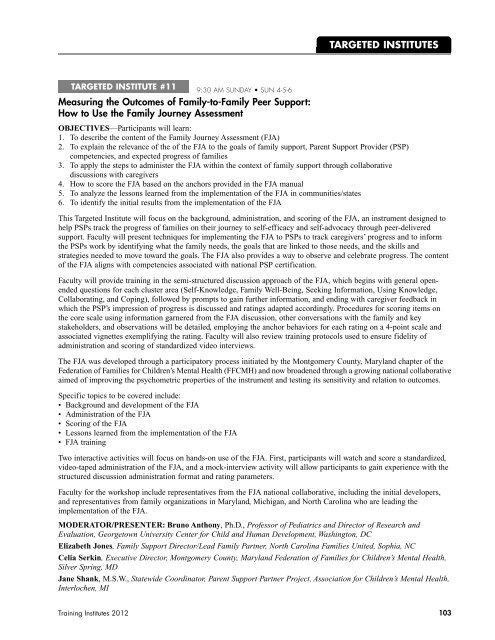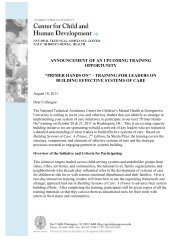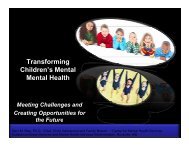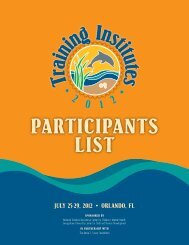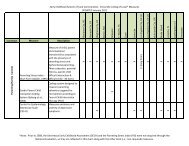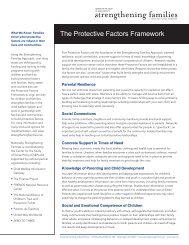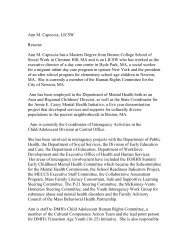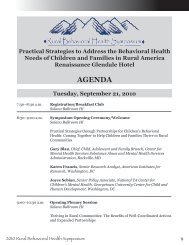Training Institutes 2012 - National Technical Assistance Center for ...
Training Institutes 2012 - National Technical Assistance Center for ...
Training Institutes 2012 - National Technical Assistance Center for ...
Create successful ePaper yourself
Turn your PDF publications into a flip-book with our unique Google optimized e-Paper software.
TARGETED INSTITUTE #11 9:30 AM SUNDAY • SUN 4-5-6<br />
Measuring the Outcomes of Family-to-Family Peer Support:<br />
How to Use the Family Journey Assessment<br />
OBJECTIVES—Participants will learn:<br />
1. To describe the content of the Family Journey Assessment (FJA)<br />
2. To explain the relevance of the of the FJA to the goals of family support, Parent Support Provider (PSP)<br />
competencies, and expected progress of families<br />
3. To apply the steps to administer the FJA within the context of family support through collaborative<br />
discussions with caregivers<br />
4. How to score the FJA based on the anchors provided in the FJA manual<br />
5. To analyze the lessons learned from the implementation of the FJA in communities/states<br />
6. To identify the initial results from the implementation of the FJA<br />
This Targeted Institute will focus on the background, administration, and scoring of the FJA, an instrument designed to<br />
help PSPs track the progress of families on their journey to self-efficacy and self-advocacy through peer-delivered<br />
support. Faculty will present techniques <strong>for</strong> implementing the FJA to PSPs to track caregivers’ progress and to in<strong>for</strong>m<br />
the PSPs work by identifying what the family needs, the goals that are linked to those needs, and the skills and<br />
strategies needed to move toward the goals. The FJA also provides a way to observe and celebrate progress. The content<br />
of the FJA aligns with competencies associated with national PSP certification.<br />
Faculty will provide training in the semi-structured discussion approach of the FJA, which begins with general openended<br />
questions <strong>for</strong> each cluster area (Self-Knowledge, Family Well-Being, Seeking In<strong>for</strong>mation, Using Knowledge,<br />
Collaborating, and Coping), followed by prompts to gain further in<strong>for</strong>mation, and ending with caregiver feedback in<br />
which the PSP’s impression of progress is discussed and ratings adapted accordingly. Procedures <strong>for</strong> scoring items on<br />
the core scale using in<strong>for</strong>mation garnered from the FJA discussion, other conversations with the family and key<br />
stakeholders, and observations will be detailed, employing the anchor behaviors <strong>for</strong> each rating on a 4-point scale and<br />
associated vignettes exemplifying the rating. Faculty will also review training protocols used to ensure fidelity of<br />
administration and scoring of standardized video interviews.<br />
The FJA was developed through a participatory process initiated by the Montgomery County, Maryland chapter of the<br />
Federation of Families <strong>for</strong> Children’s Mental Health (FFCMH) and now broadened through a growing national collaborative<br />
aimed of improving the psychometric properties of the instrument and testing its sensitivity and relation to outcomes.<br />
Specific topics to be covered include:<br />
• Background and development of the FJA<br />
• Administration of the FJA<br />
• Scoring of the FJA<br />
• Lessons learned from the implementation of the FJA<br />
• FJA training<br />
Two interactive activities will focus on hands-on use of the FJA. First, participants will watch and score a standardized,<br />
video-taped administration of the FJA, and a mock-interview activity will allow participants to gain experience with the<br />
structured discussion administration <strong>for</strong>mat and rating parameters.<br />
Faculty <strong>for</strong> the workshop include representatives from the FJA national collaborative, including the initial developers,<br />
and representatives from family organizations in Maryland, Michigan, and North Carolina who are leading the<br />
implementation of the FJA.<br />
MODERATOR/PRESENTER: Bruno Anthony, Ph.D., Professor of Pediatrics and Director of Research and<br />
Evaluation, Georgetown University <strong>Center</strong> <strong>for</strong> Child and Human Development, Washington, DC<br />
Elizabeth Jones, Family Support Director/Lead Family Partner, North Carolina Families United, Sophia, NC<br />
Celia Serkin, Executive Director, Montgomery County, Maryland Federation of Families <strong>for</strong> Children’s Mental Health,<br />
Silver Spring, MD<br />
Jane Shank, M.S.W., Statewide Coordinator, Parent Support Partner Project, Association <strong>for</strong> Children’s Mental Health,<br />
Interlochen, MI<br />
<strong>Training</strong> <strong>Institutes</strong> <strong>2012</strong><br />
TARGETED INSTITUTES<br />
103


